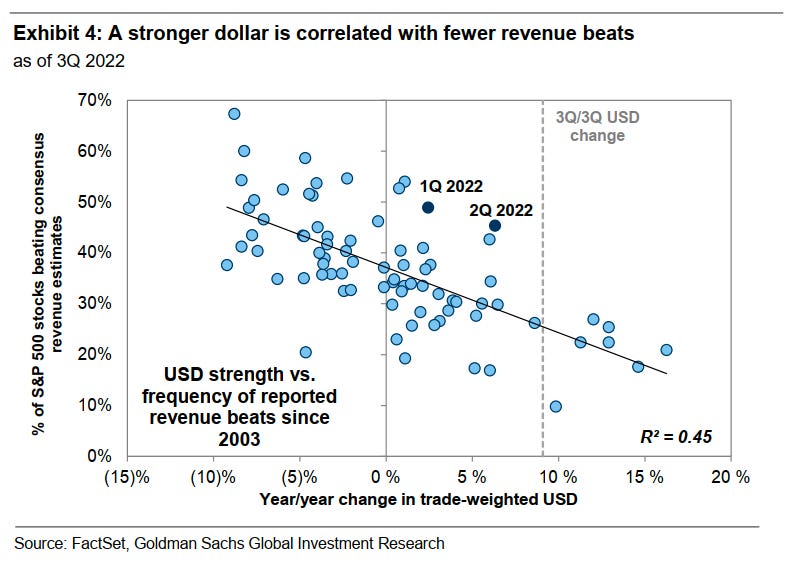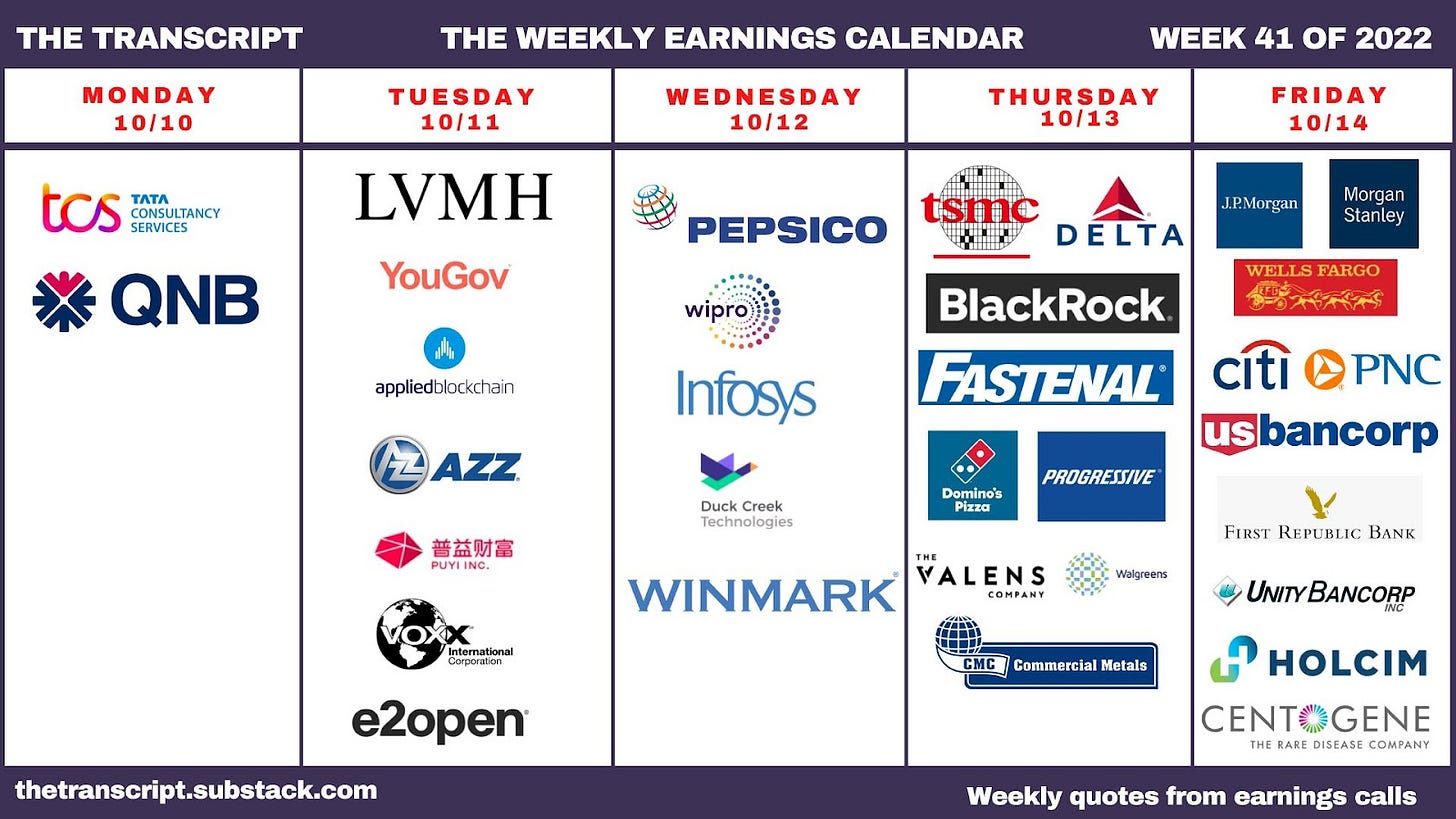Welcome to Episode 77 of the Transcript Podcast. In this episode, we discuss signs that consumer spending may be softening, the hope that inflation may start to slow soon, and the signs of heavy stress in the financial system. We also preview the Q3 earnings season as banks kick off the season this Friday.
A transcript of this podcast, with relevant images and quotes, is available for all subscribers today just below the show notes. The episode is based on yesterday's newsletter which is available on Substack.
Our podcast is also available on Apple Podcasts, Spotify, Google Podcasts, YouTube, and Amazon Music.
Show Notes
00:00:00 Introduction
00:00:08 Softening Demand?
00:01:13 Hoping for Inflation to Calm Down
00:02:47 Will the Fed Just Stop!
00:04:23 The Strong Dollar & Rising Geopolitical Risks
00:09:23 Metaverse vs AR
00:10:34 Earnings Season Preview
Transcript
Introduction
[00:00:00] Scott: Welcome everyone to a new episode of The Transcript podcast. You've got me, Scott Krisiloff, I'm editor of The Transcript, along with Erick Mokaya who's our lead author.
Softening Demand?
“The lower end of the socio-economic levels is stressed right now and we are seeing that in terms of mix and accelerated private brands, which is a major focus area for us and the interchange between food service and food sourced at retail taking home is still very dynamic in this environment” - United Natural Foods (UNFI 0.00%↑) CEO Sandy Douglass
“Our front-end performance, however, trailed expectations due to cautious consumer spending in this environment and continued supply chain challenges” - Rite Aid (RAD 0.00%↑) CEO Heyward Donigan
We sent out a new issue of the newsletter yesterday, and we had taken a week off, so this is two weeks worth of quotes that are in there. But what we saw was some signs that consumer spending is starting to soften a little bit, and there were a lot of quotes in there that were talking about softening of consumer spending, but it still doesn't quite feel like it's really completely materializing, the consumer softening. It feels like actually consumer spending, to put it a different way, it feels like consumer spending is holding up better than what would expect given the amount of anxiety that's in the economy. Erick, what do you think?
[00:00:45] Mokaya: I think that's actually the key takeaway from this week. There are some signs of stress, but the consumer is not stressed, so there are signs, that they could be cautious in terms of spending maybe shifting spend from here to there. But in terms of overall spend, not much has changed. This is an area we've been paying very keen attention to in the past few weeks. And we still don't see any really remarkable major signs that there's much change that is happening in terms of the consumer.
Hoping for Inflation to Calm Down
The hope is that inflation will slow down, but it has not yet slowed down even from the Fed speakers themselves. They keep saying that they don't see inflation coming down. I think one key takeaway, which for me stood out was one, I think one of the quotes that said that historically whenever inflation reaches this very high level, to come down, it's not like one of those things that you just wish away and then it comes down. It'll take a couple of months to flow through down, like to come down. Is that something that resonates with you when you look at the historical data that we have?
[00:01:47] Scott: I don't know exactly about that. I think there's two almost, there's like the year-over-year inflation numbers which honestly I would've expected to come down already because you would expect the year-over-year change to start to decline just because the comp is getting harder, basically. But then there's also the element of inflationary psychology, which we've talked about several times before on the podcast, where if people are expecting price increases and that inflationary psychology is starting to get built into the economy, then you would expect inflation to persist for a while. I think that the psychology is so much different than it was 10 years ago or before the pandemic when the burden was always to demonstrate why we weren't in a period of deflation. Now it very much feels like the burden of proof is on whether or not we're in a period of inflation. And as long as that's the case, the Fed is going to be a dampening for the economy most likely, especially in the stance that they are today because they'll be trying to fight inflation rather than promote growth.
Will the Fed Just Stop!
“There’s still time to step back from the edge of recession. We have the tools to calm inflation and support all vulnerable groups. This is a matter of policy choices and political will. But the current course of action is hurting the most vulnerable, especially in developing countries and risks tipping the world into a global recession” - UNCTAD Secretary-General Rebeca Grynspan
[00:02:47] Mokaya: So I think that's also the second key takeaway from the macro section that there is no respite in terms of raising rates. So I think raising rates is something that will continue for a while longer. And the impact on emerging economies is something I've also been paying very close attention to. I was surprised that there was a UN agency that put out a report and part of it was saying urging the Fed to cut back on raising rates. Yesterday when we sent out the newsletter, one of the things I also noted is Ark Invest’s Cathy Wood sending out a letter to the Fed telling them to also stop raising rates. Would you do the same? Because the impact on emerging markets is actually really significant.
[00:03:26] Scott: Yeah. In terms of emerging market economies, this is a very classic dynamic that happens in a rate-rising cycle. In the sixties, seventies, eighties and even in the nineties when there was an increase in interest rates, you had problems in Russia in the nineties, you had problems in Latin America in the eighties. This is part of the dynamic when the dollar gets stronger. If you have countries that have issued dollar-denominated debt that don't use the dollar as their functional currency, then it makes it more difficult to repay, adds stress onto those economies. And so this is something that it's not terribly surprising to see and so what you're seeing is volatility and foreign exchange markets as the Federal Reserve is raising interest rates as the dollar is getting stronger. Headwind to earnings, absolutely. And given the magnitude of the move into dollar, it's not clear whether this is priced into the market yet. So…
The Strong Dollar & Rising Geopolitical Risks
“The unfavorable impact of foreign exchange was reflected in the net sales decrease for our International segment” - Conagra Brands (CGA 0.00%↑) CFO Dave Marberger
“Reported year-over-year net sales were up 4%, including the FX headwind of $7.5 million, driven by the strengthening of the U.S. dollar, primarily related to the euro and GBP” - Enerpac Tool Group (EPAC 0.00%↑) CFO Anthony Colucci
[00:04:23] Mokaya: I bet not. This earning season, I think this is one of the most common things that you -- and we are already seeing it in earnings. A lot of companies already citing the constant currencies growth is actually better than the ones which include the FX. So I think FX effects is one of the key things to pay attention to in earnings. But a quick question, especially on the impact on the emerging markets in terms of the strong dollar then, in the eighties or nineties, I feel like the US could afford to have some of these emerging economies being impacted by the rising dollar. But in the current economic climate with geopolitical tensions, we saw something like the threat of nuclear war being one of the highest since the 1960s. So with all these kinds of risks, can the US afford to have some of these economies be decimated by a very strong dollar? It's a very unique time. There's quantitative tightening, quantitative easing happening at the same time, the strong dollar and all of these kinds of geopolitical tensions. So I don't know what you can draw in terms of your perspective from history and what that can inform maybe how an investor should think about the times as it is.
[00:05:27] Scott: Yeah. I think fundamentally the question underlying all of that is, will this impact the Fed's reaction function in the way that they are raising rates? And I think the answer is probably not. I think until, and unless international circumstances in emerging markets or in developed economies begin to impact US financial markets in a way that there's counterparty risk to a US financial institution or really the primary indicator that the Fed is looking at are just equity markets, the S&P 500 probably. If the S&P 500 were a sell-off by 10 or 15% because of something that's happening, some sort of global financial crisis, then yeah, I would expect the Fed to change its course, but right now it's just rumblings. Same thing, it's sad that we have to mention it, but I think it is worth mentioning the threat of escalation in Ukraine. Clearly, Putin is escalating today with conventional weapons, but I think people are pretty concerned because he is signalling that he may use unconventional weapons. It's a scary thing we're contending with and certainly, I would expect if something were to come about or even just the threat, it would impact capital markets to some extent. But one thing that I noted for premium subscribers is that in 1962, the Cuban Missile Crisis actually created the bottom for the stock market, a sustained bottom because of the positive resolution of the Cuban missile crisis. It's one of the few instances where a change in Fed policy was not the primary catalyst for the stock market bottom.
[00:07:03] Mokaya: Curious, how did the Fed respond at the time? Any thoughts?
[00:07:07] Scott: The Fed didn't respond directly to the Cuban missile crisis, but the Fed did, I believe, start loosening in like October of 1962 about a few weeks before the market bottom, but really when the Cuban missile crisis was resolved, you had a big, strong full market rally. That was the bottom, the type of thing that we would be looking for as the signal for the end of a bear market. 1962 is a year that's fairly analogous to 2022, 60 years later. Just in the pattern of trading that we're seeing where you had a steep sell-off at the beginning of the year, some recovery midyear, and then hopefully sustained bottom sometime within the next month or so. But it is honestly, with the way that the Fed is reacting, it seems hard to see how we would get a bottom in the next few weeks.
“For the first time since the Cuban missile crisis, we have a direct threat of the use of nuclear weapons if, in fact, things continue down the path they are going" - US President Joe Biden
“Nuclear war probability is rising rapidly” - Tesla (TSLA 0.00%↑) CEO Elon Musk
[00:07:58] Mokaya: Interesting. I think the biggest takeaway I think from the international section, of course, is the rising risk, especially of nuclear war. Given that I am stationed in Europe, I'm paying very close attention to some of these escalations that are happening, especially in Ukraine. And we hope for the best resolution of course not just for the markets, but also for the world so that it doesn't end and that we can keep doing The Transcript at the end of the day. So any other things that you picked out especially as we preview earnings season? So I think one of the key things is, of course, bloated inventories across retailers. So that's a significant risk. It seems like going into this earning season, you'd expect a lot of companies to be stuck with a lot of inventory. Demand is falling for some of the products and then the supply chain is resolving. There's a resolution of the supply chain in some of the pockets of the market. So that means a lot of companies are stuck with the inventory which they may take a while to deal with. So I think that's one key thing to check out as we head into the earnings season. And of course, tech companies, PCs and semis market is heavily challenged. So then they too are stuck with a lot of inventory. So the weakening demand is impacting them. I think there was guidance from AMD CEO Lisa Su last week about preliminary results for AMD showing that there’s weaker-than-expected PC demand, which is impacting revenues going into Q3. Any takeaways from that or any other sections?
“Preliminary results reflect lower than expected Client segment revenue resulting from reduced processor shipments due to a weaker than expected PC market and significant inventory correction actions across the PC supply chain --.The PC market weakened significantly in the quarter” - Advanced Micro Devices (AMD 0.00%↑) Chair & CEO Dr Lisa Su
Metaverse vs AR
“I always think it’s important that people understand what something is. And I’m really not sure the average person can tell you what the metaverse is. I think AR is a profound technology that will affect everything” - Apple (AAPL 0.00%↑) CEO Tim Cook
[00:09:23] Scott: Yeah. One other quote that I think is worth mentioning was the one from Tim Cook talking about augmented reality. I think I've heard Tim Cook say many times over and over, over the course of the last, call it 24 months, just that he's more bullish on augmented reality. And I feel like this is the type of thing for me where at least I'm reading it enough times where it's starting to actually hit for me, where augmented reality does seem like something which is potentially a really strong platform technology that Apple clearly seems to be pretty focused on. There was something just this weekend that kind of hit me about what a poor form factor of the smartphone actually is in terms of your interface, the internet or computing generally. The fact that we're all hunched over typing with our thumbs on a little device all day is a little bit crazy, and you would expect the new form factor to emerge at some point. Apple seems to be betting on augmented reality in some way. So maybe we'll see that. But this is maybe not so much of a public markets play, but just something to be thinking about in terms of the way that compute could evolve over the next decade.
Earnings Season Preview
[00:10:34] Mokaya: Any thoughts as banks start their earnings this week? Anything you're paying close attention to?
[00:10:39] Scott: I think honestly their comments on their capital markets businesses will be the most interesting thing. I still don't expect any credit quality deterioration to be coming through, obviously their credit card businesses as well. Getting a read on what they're seeing in terms of consumer spending and maybe some of the comments that they'll probably make in terms of commercial lending. Banks are so central to the economy that it's always nice to get earnings season launched off with some salient data.
[00:11:05] Mokaya: Yeah. And of course, we've also been paying attention, especially to mortgage, the mortgage banking side and the mortgage business and how that's been affected by the housing markets definitely.
[00:11:14] Scott: That's another comment. Mortgage rates hitting 7%. It's a massive change for the housing market. It really changes the affordability equation in a big way. And it seems like the home prices, the housing market generally just seems like it's sitting on the precipice, which would also mean that equity prices also should probably be coming down quite a bit if that's the cost of capital to buy a house, what's the cost of equity for your average S&P 500 company? It's gotta be up 7% plus, six and a half, 7%. We're not at that multiple on earnings. So if you have earnings come down and then you have a multiple that's discounting 6.5, 7% cost of capital plus, there's still some downside to the stock market.
[00:12:01] Mokaya: Yep. I just noticed some houses around here in Sweden, which are marked down almost 16 to 20%. And this is for a market that hasn’t experienced such a downturn in almost a decade and a half so significant impact on the housing market, not just in the US but globally going ahead. So I think this is a good place to close up. Thank you for joining us this week for The Transcript Podcast. I'll see you again next week as we analyze the start of the earning season for Q3. Thank you and goodbye.















